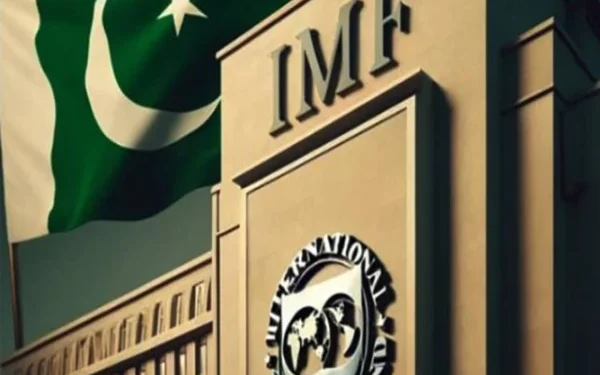Islamabad Report Highlights Governance Gaps
The International Monetary Fund (IMF) has raised serious concerns about Pakistan’s existing governance framework, stating that the country lacks essential “red flag” indicators — preventive mechanisms that can detect and stop corruption, misuse of authority, and abuse of public resources by high-ranking government officials.
The officials under the IMF’s scrutiny include heads of state, heads of government, federal and provincial ministers, members of parliament, senior bureaucrats, judiciary members, high-ranking military officials, ambassadors, and executives of state-owned enterprises. According to the IMF’s preliminary observations, without robust early-warning systems, corrupt practices often go undetected until after substantial damage has been done to public finances and governance structures.
Governance and Corruption Assessment Mission
Sources in Islamabad have revealed to The Express Tribune that the IMF shared its observations and a draft of recommendations with the Pakistani government in recent weeks. The assessment forms part of the Governance and Corruption Assessment Report, which is expected to be released by the end of this month.
The IMF had earlier dispatched a Governance and Corruption Assessment Mission to Pakistan this year. This mission held extensive consultations with over three dozen key state institutions, including financial regulators, anti-corruption bodies, law enforcement agencies, and government ministries. At Pakistan’s request, the IMF extended the deadline for releasing the final report to August, allowing the government more time to respond to its findings.
Key Findings: Weak Detection Systems and Limited Data Access
The draft report paints a concerning picture. It emphasizes that Pakistan has:
- Limited access to real-time data on officials’ financial activities.
- An absence of automated screening tools that could flag suspicious transactions.
- A severe lack of warning indicators to identify early signs of corruption or abuse of authority.
This deficiency means that effective detection of illicit activities has been inconsistent and uneven across institutions.
The IMF’s report notes that without reliable “red flag” mechanisms — such as advanced analytics, automated alerts, and mandatory disclosure systems — corruption networks can operate undetected for long periods, undermining governance and eroding public trust.
Recommendations Based on Global Best Practices
According to sources, the IMF’s recommendations are heavily influenced by international standards and successful case studies from countries such as Canada and Colombia. These countries have implemented stringent systems to:
- Reduce corruption in government procurement and contracts.
- Prevent the misuse of authority in public-sector appointments.
- Increase transparency in financial disclosures of public officials.
The IMF suggests that Pakistan adopt clear guidelines for financial institutions to monitor the sources of wealth of public officials. This includes stricter compliance checks under the regulatory frameworks of the State Bank of Pakistan (SBP), the Federal Board of Revenue (FBR), and the Securities and Exchange Commission of Pakistan (SECP).
Banking Oversight: A Weak Link
The draft assessment also identifies serious shortcomings in the system for monitoring the opening and operation of bank accounts of public officials. Weak enforcement of due diligence requirements leaves significant loopholes for illicit money flows, hidden asset accumulation, and the funneling of public funds into private accounts.
Although Pakistan has made efforts to introduce mechanisms aimed at reducing corruption, the IMF found that many institutions lack the specialized understanding of complex financial crimes needed to detect and address them effectively.
Institutional Shortcomings and Lack of Awareness
One of the IMF’s critical observations is that many institutions reporting to regulatory bodies do not fully understand the nuances of corruption detection. While rules and regulations may exist on paper, the capacity to interpret, implement, and enforce these laws effectively is often missing.
For example, financial monitoring bodies may overlook certain suspicious patterns simply because their internal systems are outdated or underdeveloped compared to international benchmarks.
Global Comparisons: Lessons for Pakistan
The IMF cites examples from Canada, where public procurement systems have been digitized and made transparent to minimize opportunities for corruption. Similarly, Colombia has implemented automated contract monitoring systems that trigger alerts when irregularities are detected, such as sudden cost escalations or unexplained changes in supplier profiles.
If adapted for Pakistan, such systems could:
- Provide real-time monitoring of government contracts.
- Reduce human discretion in approval processes.
- Create a traceable digital record for every transaction.
Government’s Response and Internal Review
The Ministry of Finance has reportedly issued instructions to various government departments, giving them until last Friday to respond to the IMF’s draft observations and recommendations.
According to sources:
- Some departments have accepted parts of the IMF’s findings, acknowledging weaknesses and committing to reforms.
- Others have disagreed, arguing that certain recommendations may not be suitable in Pakistan’s specific governance context.
- Some agencies have called for a review, claiming that the IMF’s assessment does not fully account for recent anti-corruption measures taken by the government.
Potential Delay in Final Report
The process of reviewing each IMF recommendation is expected to be cumbersome and time-consuming, which could delay the publication of the final Governance and Corruption Assessment Report.
Government insiders say that political sensitivities surrounding high-profile corruption cases may also influence how quickly — and how transparently — the recommendations are implemented.
Why “Red Flag” Indicators Matter
In governance and anti-corruption frameworks, “red flag” indicators are warning signs or automated alerts that signal potentially corrupt or unethical activities. These can include:
- Sudden, unexplained increases in wealth.
- Frequent large cash withdrawals or deposits by officials.
- Procurement contracts awarded to previously unknown companies.
- Significant changes in lifestyle inconsistent with declared income.
The absence of such tools means that wrongdoing often goes unnoticed until investigative bodies receive a formal complaint — by which point, the financial and reputational damage has already been done.
Economic Context: IMF’s Broader Interest in Governance
The IMF’s focus on governance reforms in Pakistan is not just a matter of ethics; it is closely linked to economic stability and foreign investor confidence.
Corruption and abuse of power are widely recognized as key factors that:
- Discourage foreign direct investment (FDI).
- Reduce the efficiency of public spending.
- Erode tax collection and widen the fiscal deficit.
Given Pakistan’s current economic challenges — including high inflation, currency depreciation, and a heavy external debt burden — improving governance is seen as essential to ensuring the success of IMF-supported economic reforms.
The Road Ahead: Reform or Resistance?
Whether Pakistan acts decisively on the IMF’s recommendations remains to be seen. Implementing a robust “red flag” system will require:
- Significant technological upgrades to government databases.
- Strong political will to hold even powerful officials accountable.
- Training programs for regulatory bodies to identify complex financial irregularities.
Experts caution that while structural reforms can be introduced, they will only be effective if backed by consistent enforcement and a culture of transparency.
Conclusion: An Opportunity for Change
The IMF’s draft report serves as a wake-up call for Pakistan’s policymakers. The absence of effective early-warning mechanisms against corruption is not just a governance flaw — it is an economic risk that could undermine public trust and hinder national progress.
If Pakistan takes concrete steps to modernize its oversight systems, draw on international best practices, and ensure independent enforcement, it could strengthen not only its governance structure but also its economic resilience in a highly competitive global environment.

























